

Real Online Privacy for Beginners: 60+ Essential Tips and Warnings. Companies and governments are spying on you all over the internet and beyond.
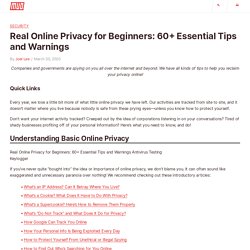
We have all kinds of tips to help you reclaim your privacy online! Quick Links Advertisement Every year, we lose a little bit more of what little online privacy we have left. Our activities are tracked from site to site, and it doesn’t matter where you live because nobody is safe from these prying eyes—unless you know how to protect yourself. Don’t want your internet activity tracked?
Understanding Basic Online Privacy If you’ve never quite “bought into” the idea or importance of online privacy, we don’t blame you. Online Privacy While Browsing the Web These days, the moment you connect to the internet, you start leaving traces of who you are and what you’ve done with every single action. Cybersecurity. In the wake of school shootings, bullying, natural disasters, and other threats, districts are increasingly turning toward technological systems to enhance the safety of their campuses.
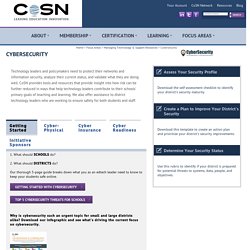
These technological systems, known as Cyber-Physical Security Systems (CPSS), bridge the physical and digital environments. CPSS equipment can range from entryway cameras, automatic locks, and intercoms to facial recognition software and biometric readers. 2018 Year in Review – The K-12 Cybersecurity Resource Center. Schools are increasingly relying on technology for teaching, learning, and school operations. What do we know about the cybersecurity risks they are facing?
What can leaders do to mitigate or reduce those risks? Credit: Jason Kravitz CC BY 4.0 The definitive report on cyber incidents affecting U.S. public elementary and secondary (K-12) education institutions during 2019: An abridged PDF version of the report is also available for direct download here. Suggested citation: Levin, Douglas A. (2020).
The publication of this report was made possible with the generous support of Technology Resource Advisors, ManagedMethods, PC Matic PRO, and Gradient Cyber. A third of all Chrome extensions request access to user data on any site. This device is unable to play the requested video.

More than a third of all Google Chrome extensions ask users for permission to access and read all their data on any website, a recent survey of over 120,000 Chrome extensions has revealed. The same survey also found that roughly 85 percent of the 120,000 Chrome extensions listed on the Chrome Web Store don't have a privacy policy listed, meaning there's no legally-binding document describing how extension developers are committing to handling user data.
Additional survey findings include the fact that 77 percent of the tested Chrome extensions didn't list a support site, 32 percent used third-party JavaScript libraries that contained publicly known vulnerabilities, and nine percent could access and read cookie files, some of which are used for authentication operations. CRXcavator. Google releases Chrome extension to check for leaked usernames and passwords. This device is unable to play the requested video.
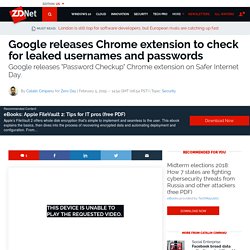
Today, on Safer Internet Day, Google has released a new Chrome extension named "Password Checkup" that checks if usernames and password combinations entered in login forms have been leaked online during past data breaches and security incidents. Also: Online security 101: Tips for protecting your privacy The extension works every time users log into an online service. The extension takes the username and password entered in the login form and checks them against a database of over four billion credentials that Google engineers have collected from public breaches in the past few years.
Bark for Schools - Bark. When schools give students access to laptops and email accounts through platforms like Google Suite and Outlook 365, an incredible world of learning opportunities opens up — as well as potential dangers.
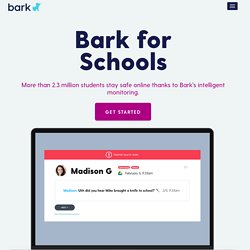
As schools know, keeping kids safe with today’s technology begins with limiting access and blocking adult content to keep things PG. But online safety doesn’t end there. A bigger issue remains: How to monitor all of the content your students are creating, sharing, and sending. Cybersecurity. In the wake of school shootings, bullying, natural disasters, and other threats, districts are increasingly turning toward technological systems to enhance the safety of their campuses.
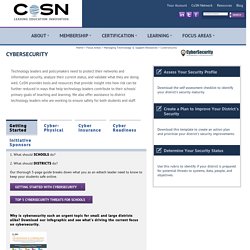
These technological systems, known as Cyber-Physical Security Systems (CPSS), bridge the physical and digital environments. CPSS equipment can range from entryway cameras, automatic locks, and intercoms to facial recognition software and biometric readers. PicoCTF - CMU Cybersecurity Competition - Homepage. We Let 300 IT Professionals Ask Our Cloud Security Expert Any Question They Wanted, These Were the Best. Before we jump into the security Q&A, we have an exciting announcement to make.
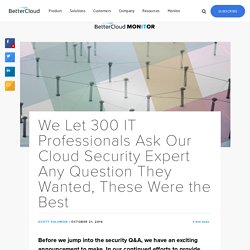
In our continued efforts to provide you with the best IT resources possible, we are excited to announce our latest endeavor: a brand-new Slack community called BetterIT. BetterIT is a Slack community exclusively for leading IT professionals who are creating SaaS-powered workplaces all around the world. We wanted to create a place where our audience (of more than a thousand IT professionals) could connect during our online event, Cloud IT Live (which kicks off today!). But why limit the community Cloud IT Live? Why not create an active community of like-minded and forward-thinking IT professionals? For the past few weeks, we’ve slowly invited IT professionals from leading organizations around the world.
You can join and contribute to the conversation today by visiting: bettercloud.com/slack-community. The First-Ever BetterIT Slack AMA Below are some of the highlights of the AMA, edited for clarity. Information Technology Security Consultants. Start in Infosec · Christopher Truncer's Website - A Hacker's Perspective.